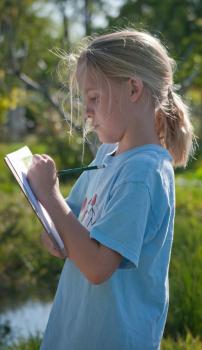
Nature Bridge - See ,Think, Wonder! Naples Botanical Garden Open for Exciting Possibilities

- School:
- Vineyards Elementary
- Subject:
- Science
- Teacher:
- Suela Spahiu
- Marlena Arfuso, Debra Carpenter, Melissa Kelley, Vanessa Abrantes, Debra Dean, Nayvi Fernandez
- Students Impacted:
- 140
- Grade:
- 2
- Date:
- September 2, 2018
Investor
Thank you to the following investor for funding this grant.
Suncoast Credit Union - $1,204.65
Original Grant Overview
Goal
Purpose: To develop activities according to the Inquiry-Based Science Education methodology, focused on a field trip to the Naples Botanical Garden, that promotes the learning of Natural Sciences.
Goals:
-To develop a didactic strategy through inquiry in a science museum.
- To assess formatively the impact of the strategy on student learning.
- To reflect on the implementation of inquiry activities in VES.
What will be done with my students
Subject: Natural Sciences
Curricular contents: Earth's sustainability, Ecosystems and Sustainable Resource Management
Investigative Skills: Identify problems, Plan investigations, Analyze, and interpret data,
The Activity is planned based on the theoretical model of the 5 E's of Bybee (2006).The first phase of engagement for the classes target is to combine the theme of the activity: "The Botanical Garden as a privileged space for learning outside the classroom". At this stage, the classes will construct a concept map based on the questions: "What is a Botanical Garden?" And "What is the use of a Botanical Garden?" (ENGAGEMENT).
The classes will also use Thinking Maps Tools to build concept. The construction of this conceptual map permits the identification of the initial ideas of the class (EVALUATION), and recognition of some alternative conceptions. Students will draw the following topics: biotic relations; adaptations to different humidity conditions; adaptations of carnivorous plants; plants as natural resources; conservation of plant biodiversity and the life cycle of butterflies.
Through a checklist, the definition of the research problem to be investigated in the field trip to the Botanical Garden will be assessed (EVALUATION) During the field trip to the Botanical Garden, data collection will carry out according to the planning. Students will record of the observations (EXPLORATION). The observations of the work developed in the Botanical Garden will be in field notes (EVALUATION). Student will analyze and discuss the results (EXPLORATION), autonomously, then communicating their conclusions properly substantiate (EXPLANATION). Students will be supported through the Facetime platform and via e-mail. In this way, feedback will be provided about the presentation in order to be able to improve it - formative evaluation (EVALUATION).
In a classroom lesson, the students will communicate the investigative work developed. (EXPLANATION).
The analysis of the data will be exposed in the PowerPoint presentation.(EVALUATION).
Benefits to my students
Out-of-school learning experiences involve many characteristics of formal learning, complementing it by allowing the construction of knowledge with personal meaning, the realization of genuine choices and challenging tasks, taking control over the process of learning and collaboration with others. Visits to locations beyond the classroom offer students opportunities to develop new skills, observe actual specimens rather than models or photographs, and stretch their senses. Botanical Gardens offer learning opportunities for practical and multi-sensory activities with plants.
In this context, inquiry-based science education provides students with an inspiring environment with the needed tools and opportunities to discover and use them on their own. The essential features of inquiry are:
• learner is engaged in a scientifically oriented question,
• learner gives priority to evidence in responding to the question,
• learner uses evidence to develop an explanation,
• learning connects the explanation to scientific knowledge,
• learner communicates and justifies the explanation.
When developing an inquiry-based science education activity, the teacher does not explain everything but is a facilitator who supports the students in finding their own solutions and provides help only when needed or required Field trips are an extension of the formal science classes, functioning as an integrating element of contents and learning. In some cases, they are a motivational element to later allow the consolidation of learning in the classroom. In other cases, they constitute a form of consolidation of previous learning.
Budget Narrative
Students admission fee is 5$
Adults Admission fee is 14.95
Busses for transportation 5 hours x 20$
2 Busses will be required. for the whole team
Items
| # | Item | Cost |
|---|---|---|
| 1 | Admission: Self-guided/students 5$ for each | $700.00 |
| 2 | Admission: Teachers $14.95 | $104.65 |
| 3 | Buses | $400.00 |
| Total: | $1,204.65 |



Share
Please share this page to help in fulfilling this grant.
Email to a Friend